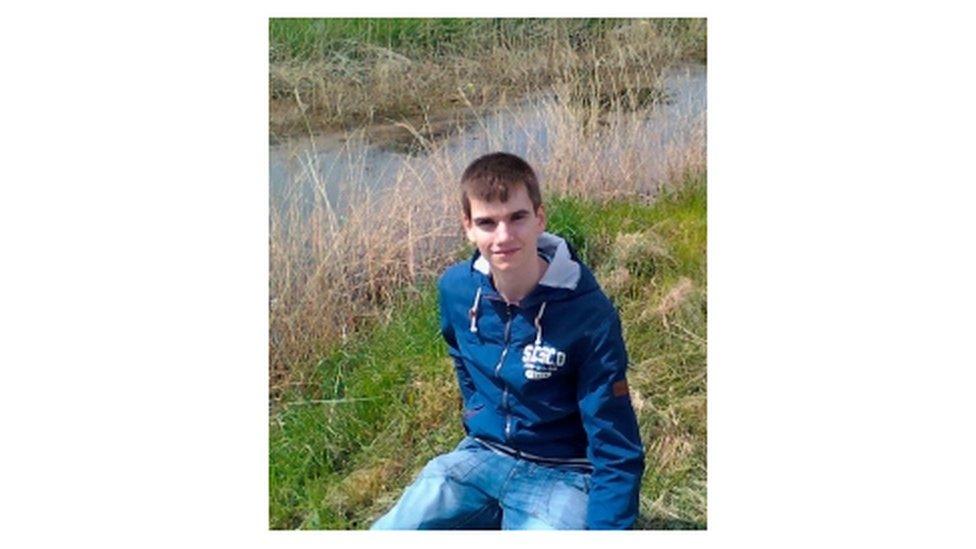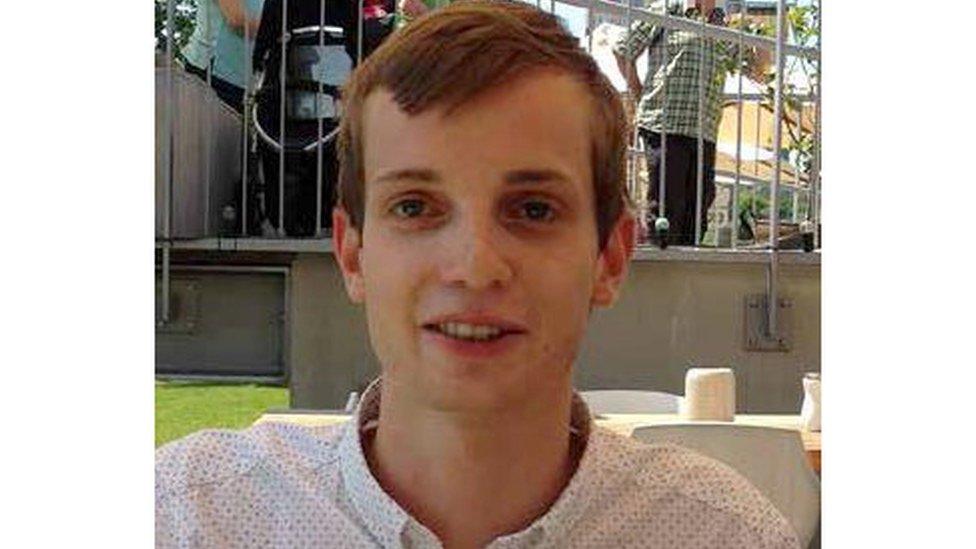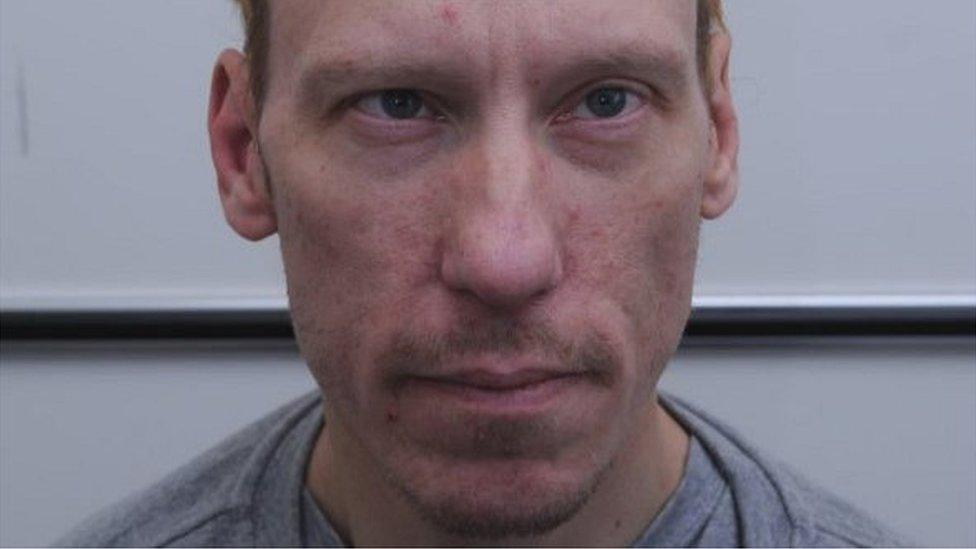Stephen Port case: Coroner raised concerns about police investigation
- Published

Daniel Whitworth, 21, was found dead in a Barking churchyard in September 2014
A coroner at the inquest into the death of one of serial killer Stephen Port's victims had concerns that someone else might have been involved, months before Port killed again, transcripts show.
Port, 41, from east London, was found guilty on Wednesday of four murders.
At the inquest into Daniel Whitworth's death, the coroner recorded an open verdict as she was not convinced it was suicide, despite an accompanying note.
Police were advised to test items found by his body for DNA, but they did not.
The police watchdog is investigating how the serial killer case was handled.
The Independent Police Complaints Commission is examining the initial police response to the deaths of the four men in London.
A total of 17 Metropolitan Police officers are under formal investigation.
Fake suicide note
Port met his victims on dating websites, including Grindr, and coaxed them to his home in Barking for sex before giving them fatal doses of drugs.
Three of the bodies were found dumped in or near a graveyard within 500m of his flat - the other was found outside his front door.
Port, who is due to be sentenced on Friday, was found guilty of four counts of murder, 10 offences of administering a substance with intent, four rapes and four sexual assaults.
Daniel Whitworth, 21, was found dead in the churchyard on 20 September 2014, three weeks after the body of another victim - 22-year-old Slovakian Gabriel Kovari - had been found in the same spot.
Mr Whitworth was found wrapped in a blue bed-sheet and had a bottle of the drug GBL in his pocket.
A fake suicide note found in his hand - which had in fact been written by Stephen Port - said Mr Whitworth had accidentally killed Mr Kovari and was taking his own life as a result.
The note also said: "Please do not blame the guy I was with last night", a reference to Port.

Slovakian Gabriel Kovari, 22, was also found in the Barking graveyard
Detectives from Barking and Dagenham Police accepted the note at face value and treated both deaths as non-suspicious.
A number of concerns were raised by the coroner at Mr Whitworth's inquest in June 2015. Three months later, the body of Port's fourth victim, Jack Taylor, was found.
The coroner said that her "concerns of a third party involvement in Daniel coming to be in the graveyard on 20 September cannot be allayed by the evidence that has been produced to the court".
Transcripts, obtained by the BBC, show coroner Nadia Persaud questioned Det Insp Rolf Schamberger about the police response to the death.
She noted that a pathologist had recommended the bed-sheet should be further examined, and asked whether that had been done.
Det Insp Schamberger said it had not, saying the "circumstances at the time indicated towards no other external parties being involved".
"The potential outcome of having the blanket analysed, the bed-sheet analysed, could have been to identify maybe where he had been the night before, who had contact with him. But it wasn't submitted," he added.
When the bed-sheet was tested, after Jack Taylor's death, it was covered in Port's DNA and was found to be from his bed.
Police had samples of Port's DNA, so would have been able to identify him, had they checked.

Port, 41, a former chef from east London, was found guilty on Wednesday of four murders
Asked at the inquest for his conclusions on the investigation, Det Insp Schamberger said: "The conclusion was that we have been unable to piece together Daniel's last movements, or how he got to the place in the graveyard where he ended up.
"And, given the circumstances that he was found with the note that he had written, and the small brown bottle containing the liquid which turned out to be a drug that..."
The coroner interrupted to ask: "That was tested, was it?"
The response came: "It was tested and found to contain G (or GHB). But there was nothing to indicate that it hadn't been self-administered, and that it appeared to be a suicide."
When he was then asked if the bottle was tested for fingerprints or DNA, Det Insp Schamberger said he thought only the contents were tested.
Port's DNA was also later found on the bottle.
Det Insp Schamberger told the inquest that police officers had checked the note found with Whitworth's body against one of his diaries, but confirmed that a handwriting expert had not been consulted.
When it was eventually checked, an expert concluded that the author of the note was not Whitworth but the handwriting was a match for Port's.
The coroner asked if attempts had been made to trace the person referred to in the note.
The detective said attempts had been made but that none "provided any further leads as to who he might have been with on that night."
In the eventual trial of Stephen Port, prosecutors said: "Daniel's movements prior to his death were not checked, and no attempt was made to trace the person referred to in the note as 'the guy I was with last night'."
The detective confirmed that officers had not been able to eliminate the possibility that Mr Whitworth's body had been moved but, despite this, further inquiries did not take place.
'Body moved'
Recording an open verdict at the inquest, coroner Nadia Persaud concluded by saying she had "some concerns" surrounding Mr Whitworth's death which had not been answered by the police investigation.
Most concerning were the pathologist's findings of manual handling prior to his death, she said, highlighting a suggestion that someone had lifted Mr Whitworth from under his arms.
"This does raise, in my mind, the question of someone moving him," she said as she ended the inquest at Walthamstow Coroner's Court.
"Although it was strongly recommended, the bed-sheet that he was found wrapped in was not forensically analysed, and the bottle of GLB which was found near him was also not tested for fingerprints or DNA.
"The police were not able to locate and identify the person that Daniel appears to have been with the night before he passed away," she added.
"That person may have been able to provide some helpful information to the investigation."
- Published24 November 2016
